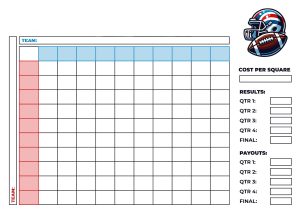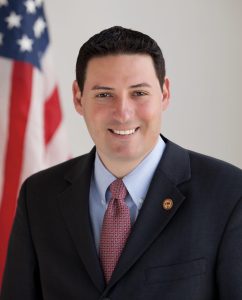Fees, taxes proposed for Super Bowl pool sheets
By Bill Dwyer For Chronicle Media — February 5, 2025
Legislation proposed by state Rep. John Cabello, R-Machesney Park, would place hefty fees on and limit the maximum payouts for sports grid sheets.
Buying one or more squares on a Super Bowl grid sheet and watching the game with an eye on the score at the end of each quarter, hoping to win a couple of hundred bucks, has become almost as common in February as handing out candy on Halloween.
Estimates range upwards of 40 million players annually, and most major sports books now offer a version of Super Bowl squares.
The practice is so ingrained in American sporting life that packs of printed pool forms are available for $2 or $3 on Etsy and Amazon, though they can also be obtained free on Google Docs.
The practice dates back at least to the 1970s, and can be used for any football game, like the College Football National Championship, and not just the Super Bowl. The squares are seen everywhere from offices to warehouse floors to the backbar mirrors in pubs and sports bars, and, more and more, online, used by a growing number of nonprofit organizations.
In technical terms, Super Bowl squares are “a grid-based game of chance.”
You don’t have to know a thing about football to play. In fact, it doesn’t matter if you know the difference between a hashmark and an end zone; you can still win a nice wad of currency for a small wager.
Now legislation proposed by state Rep. John Cabello, R-Machesney Park, would place hefty fees on every aspect of that process, and limit the maximum payouts to boot.
House Bill 1047, also called the Social Gaming Act, is still in the earliest stages. It was filed Dec. 17 and had its first reading Jan. 9. It’s now in the five-person Rules Committee, which is chaired by state Rep. Robyn Gabel, D-Evanston.
Cabello who is also a Rockford police detective, represented the 68th District between 2012 and 2020, and the 90th House District since 2022.
Cabello’s Social Gaming Act provides that no person may operate a social gaming board game or

John Cabello
manufacture and distribute social gaming boards without a license issued by the Illinois Gaming Board.
Under the current text of the proposed law, any person drawing up a squares grid and collecting $5 to $10 from friends and family and co-workers would be termed a social gaming board “manufacturer” and “distributor.”
The office or bar or social hall where the paper with the squares on it was taped up, or any other location where money was collected and paid out, would be a “social gaming location,” that is, “an eligible location at which bets on a social gaming board game must be placed and paid off within the social gaming location.”
Each “manufacturer” would have to pay a $5,000 license fee, and each “distributor a $1,000 license fee. Every “location” where a gaming square sheet is taped up would be required to pay a $50 fee or tax.
And the proposed law is definitive on the issue of running a game without paying a fee, saying, “No person may operate a social gaming board game or manufacture and distribute social gaming boards without a license issued by the (Illinois Gaming) Board.”
The law would also severely limit the amount of money that could be paid out on any one sheet of squares; it states, “The operator of a social gaming location shall not pay out more than $1,199 per social gaming board game.”
That’s a bit more than many games payout, but a lot less than many others pay out. One youth football league in the south suburbs charges $50 a square and pays out a total of $3,000 in winnings. A law enforcement support and advocacy group charges $400 a square and pays out a total of $20,000, including $10,000 for the final score.
“That’s going to go over like a lead balloon,” said one man who tended bar part-time in the western suburbs for years, and asked that his name not be used. “I think it’s a goofy idea.”
Others think the language needs a bit of tweaking.
Deb Parquette, president of Purrfect Cat Rescue in Crystal Lake, used an online version of the Super Bowl squares last year (“Buy a square, help some kitties”) and was pleased with the approximately $1,000 it raised.
“I am pleased with any way I can raise money for my nonprofit,” said Parquette. She said she would not be happy having to pay fees and taxes.
“Any money I have to take away from what I’m doing is always a disappointment,” she said. “I would like to see no restrictions on not-for profits.”







